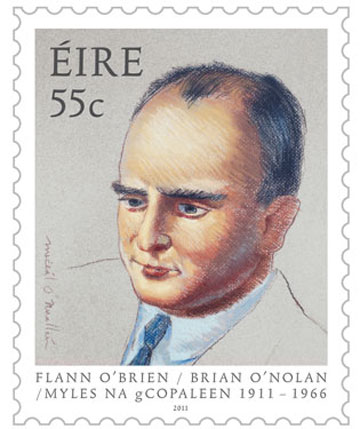Yesterday was the centenary of the birth of Flann O’Brien, aka Brian O’Nolan, aka the author of the great post-modern novel, At Swim Two Birds, and (as Myles na gCopaleen) of the Cruskeen Lawn column in the Irish Times. To my gratified astonishment, Official Ireland, having done its best over the years of his life to belittle and ignore him, finally did the decent thing and put him on a commemorative stamp. And, in a very nice touch, the drawing of him was done by his brother, Michael.
I write with feeling on this matter. During my childhood in the 1950s, O’Brien wrote an astonishingly anarchic column for the Irish Times, then the eccentric house-organ of the Protestant ascendancy, edited by a gifted oddball named R.M. Smyllie, who had earned the undying hostility of the Catholic hierarchy because (a) he edited a Protestant newspaper, and (b) had strongly opposed General Franco, the Fascist dictator beloved of all Irish bishops. Since I grew up in a fervently Catholic household, the Irish Times was regarded as the spawn of the devil, and a copy of the paper never crossed the threshold. (Our newspaper fare was the Irish Press, the organ of Fianna Fail and the de Valera family, and the Irish Catholic, a devotional publication of stupefying piety.) But every so often I would pick up a snatch of conversation about this guy Myles na gCopaleen — literally “Myles of the Little Horses” — and wonder what the fuss was about. I determined that, one day, I would find out.
Eventually, when I was sixteen I saved up enough money to go to Dublin for a few days (staying with a relative, who lived in Ballsbridge and was deemed sufficiently strict to be able to keep an eye on me). On the first morning she inquired brightly whether I had plans for the day, and beamed approvingly when I told her that I was hoping to visit the National Library, then next to Leinster House in Kildare Street. So I took the bus down to Stephen’s Green and made my way to the Library, past a glowering custodian, lurking like the basilisk in his cave. Once inside, I discovered that I had lowered the average age of the readers by at least four decades. Undeterred, I requested back numbers of the Irish Times, which arrived, as I recall, in huge bound volumes, and commenced to read my way through the Cruskeen Lawn columns.
Coming to Myles for the first time, I found him intoxicatingly funny, which is how I came unstuck. One column in particular (I think it was one where he had put the image of a finger pointing at the Leading Article which ran alongside, the argument of which he then proceeded to ridicule) was so hilarious that I was racked by hysterical laughter. And then I suddenly noticed other readers looking disapprovingly at me, and the duty librarian over by the door talking grimly to the custodian and pointing at me. He advanced menacingly and said “We don’t want your sort here, sonny. This is a serious place. Out with yer!”. Or words to that effect.
I’ve loved Flann O’Brien’s work ever since that day. His newspaper did him proud on his centenary, with a story about the new stamp, a reprint of one of his nicest columns (in which he discusses the importance of the word “supposed” in Irish daily life) and some letters from readers drawing learned attention to his various exploits.

